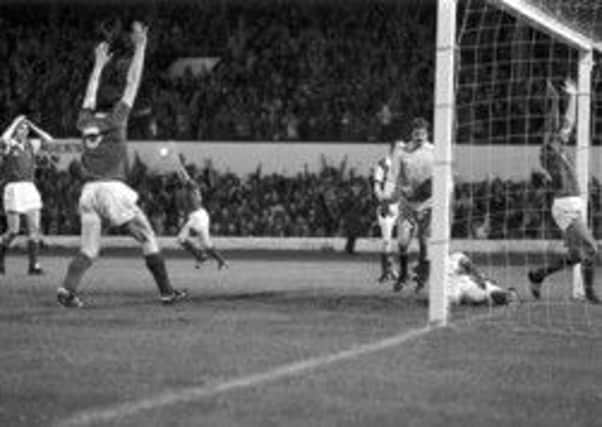Simon Pia: Street of dreams beckons yet again


This “road of sorrows” that winds its way east from the wastelands around Hampden has witnessed many a Hibs support drift away like a defeated army.
I have been a dejected pilgrim on this route at least eight times and that’s counting only finals.
Advertisement
Hide AdAdvertisement
Hide AdBut it was after one of the many semi-final defeats – against Dundee United in 2005 – that more than 100 years of hurt really hit home. The black humour was beginning to surface as I climbed back onto the bus on Prospecthill Road only to see a distraught Lawrie Reilly staring into the distance.
“Lawrie,” I asked “are you all right?’
“I’ll never see it happen,” he muttered, glazy-eyed. He then looked up at me. “I’ll never see them win the cup”.
What touched me was this truly great Hibs legend thought this had been his last chance. Hibs rarely got to finals and time was running out. But little did either of us know that there would be at least another two finals coming along shortly. But Lawrie’s grief took me back to the interview I did with him for my book Sunshine on Leith and his major regret that the Famous Five never won the cup – in an era when it was more important than the league title.
The more one looks at Hibs’ bizarre 111-year “record” and the fact not even our finest side could do it, you begin to understand the fanciful notions of the curse. It dates back to when they took down the harp from the stand in the Fifties and an Irish gypsy swore we’d never win the cup until that emblem it returned to its place of prominence. No matter the curse ignored the fact the harp had done not much good in half-century since 1902. But that day at Hampden with Lawrie in 2005, I’d bumped into a distant cousin up from Liverpool before the game. We quickly embraced before running our separate ways to catch the whistle and he shouted back to me.
“Remember what my mum always told me. Vince, son, the Hibs will always let you down”. Just one of many nuggets of Edinburgh Italian wisdom I’ve treasured over the years.
At my first Scottish Cup final in 1972 it was all so different. There were more than 100,000 in the giant bowl as clouds of dust swirled over rivers of beer and urine. Expectation was high. This was the great Turnbull’s Tornados and it was not just Hibs fans who fancied their chances. But an evenly balanced game exploded in the second half with one of Celtic’s infamous rampages.
The 6-1 defeat was the second tattoo of the mark of the beast that scarred a generation of Hibs fans. The first was 6-2 defeat in 1968 League Cup final and the third was to follow in 1975, this time 6-3 and another goddam Dixie Deans’ hat trick.
But while games against Celtic were usually full of trauma, we regularly turned over Rangers at that time, so the marathon three-game final of 1979 had not the same trepidation. Apart from getting pulled over by the police for giving a two-finger salute to the new Prime Minister as our paths crossed with her en route way to the Scottish Tory conference ahead of the first game, the most vivid memory came in the second replay as Arthur Duncan sailed through the air to find the net with a beautiful flying header. Jim McArthur didn’t have a chance – and that was the problem. It would have been a whole lot better if it had been Peter McCloy clutching a fistful of fresh air.
Advertisement
Hide AdAdvertisement
Hide AdFast-forward another couple of barren decades to 2001 and it was Celtic again. Climbing the Hampden steps I ran into another Hibs icon, Jimmy O’Rourke. “Jimmy,” I said “can we do it?” He clasped his breast. His shirt was green. “In my heart, Simon, in my heart.”
But that’s all it was – in our hearts. They had Henrik Larsson, we had Marc Libbra.
Another decade on and there was not even any wishful thinking as I bumped into Pat Stanton at half-time last year. Despite pulling the score back to 2-1, the Quiet Man was under no illusion. “We’re in big trouble. We’ll be lucky if it stays at this.”
For most of my Hibs generation, Pat is the all-time icon. I have always felt that no one since then has been fit to lift the Scottish Cup if Pat had not got to do it. Back in ’72 after the final I’d gone with a few other misguided souls to clap the Hibs team off the bus at the North British Hotel. They filed past white-faced bar for Pat. He gave us a tearful wave as the empty bus with him and the driver pulled away, a captain going down with his ship.
To paraphrase Sir Alex Ferguson, then: “Hibernian, bloody hell’. What sort of a club are we that reduces men like Pat Stanton and Lawrie Reilly to tears?
But as we return to Hampden, again, the media mania this past week about the film The Great Gatsby, has a certain poignancy. Gatsby, too, had an unattainable dream and the final words of F Scott Fitzgerald’s lament to the loss of the American dream are a fitting epitaph for Hibs’ dream. Maybe we could stick them up on the stand instead of the harp.
“So we beat on, boats against the current, borne back ceaselessly into the past.”